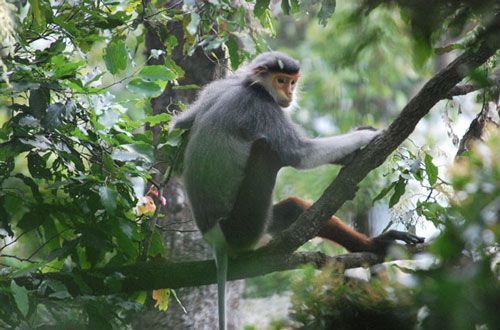In an effort to conserve the high value of the world’s biodiversity, and that of Viet Nam in particular, in recent years Da Nang’s government has issued many policies to maintain the integrity of the ecosystem on the Son Tra Peninsula. These should help to ensure the sustainable development of all the plants and animals which live on the peninsula, and especially the red-shanked douc langurs, the world’s rare primates.
Unlike other primates, the langurs only move by leaping across the branches of trees. The 7 - 8m wide roads constructed for tourism activities on the peninsula have affected their natural habitats and disrupted their food sources, which are mainly leaves and fruit. To deal with the matter, by late 2011, the city’s authorities had decided to build “tree bridges” of large inter-connecting tree canopies across the new roads in the Son Tra Nature Reserve to facilitate the langurs’ movements.

One of the over 300 red-shanked douc langurs on the Son Tra Peninsula
Dr Ulrike Streicher PhD, a wildlife veterinarian, said that this effective method will help to reduce the danger of these rare primates becoming extinct. She added that the forested areas between the roads should ensure the long-term survival and growth of this special species.
Her partner, scientist Larry Ulidarri from the University of Colorado, said that the “tree bridges” show the city’s strong determination to conserve the natural values and integrity of the ecosystem, as well as to provide an opportunity for tourists to enjoy the stunning scenery of the peninsula.
The city’s authorities have also approved the master plans for developing projects on the peninsula. The Deputy Head of the Management Board of the Son Tra Peninsula and Da Nang Tourism Beaches, Mr Phan Xuan Tiep, remarked that tourism development projects are required to strictly comply with the construction regulations, and have a minimal effect on the natural environment. This will help to firmly protect the natural resources for future generations, he added.